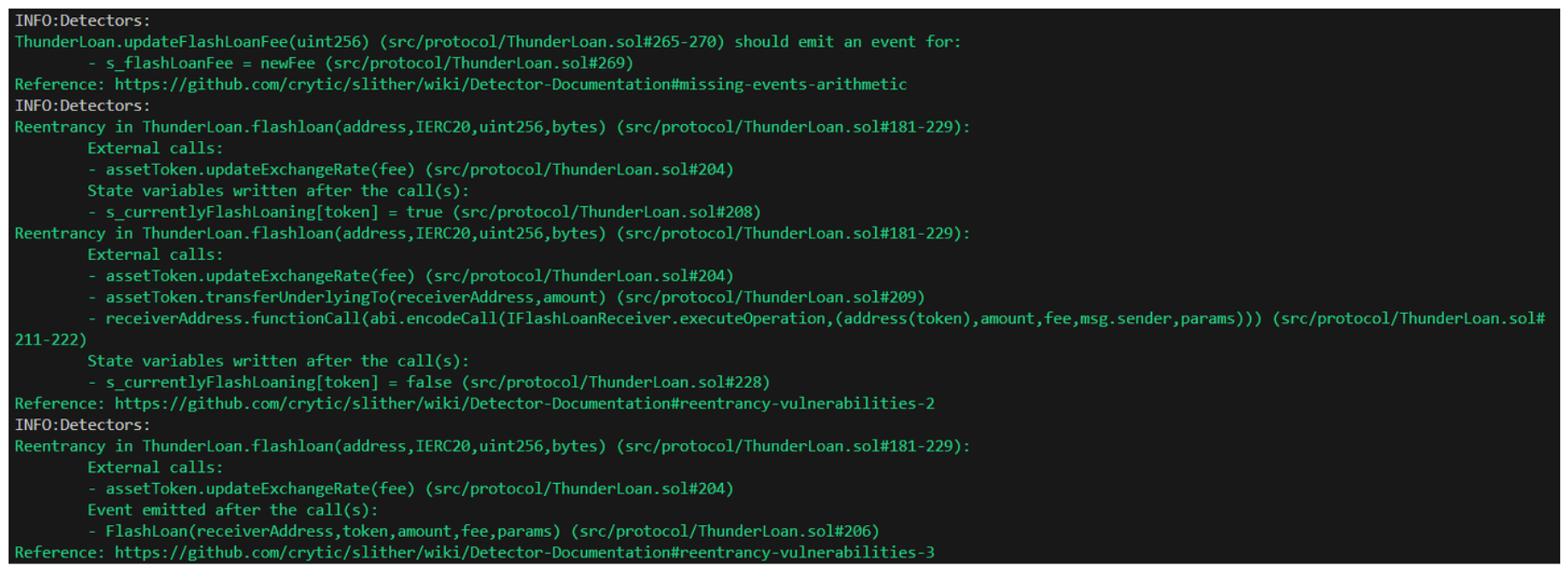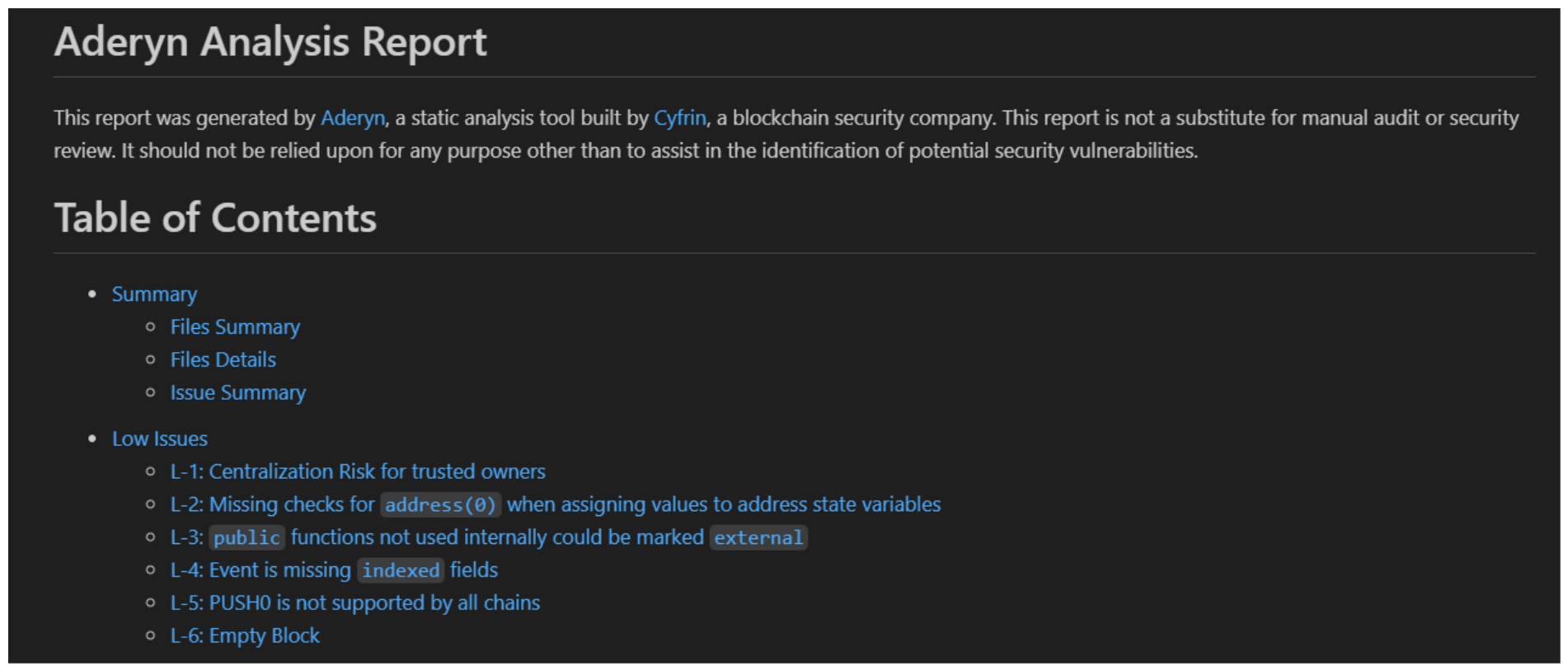--- ### Static Analysis Slither + Aderyn Ok! We're ready to start attacking this code base and identifying vulnerabilities. A good first step is our static analyzers of course. ### Slither Moving forward each of our lesson repos is going to have configured a `make` command for `Slither`. I'm including this to make our lives a little easier by having it consider a slither.config.json for our tests. You can customize your configuration file however you'd like, but this is an example of one I like to use which includes several popular flags to toggle on or off based on circumstance. ```json { "detectors_to_exclude": "conformance-to-solidity-naming-conventions,incorrect-versions-of-solidity", "exclude_informational": false, "exclude_low": false, "exclude_medium": false, "exclude_high": false, "disable_color": false, "filter_paths": "(mocks/|test/|script/|upgradedProtocol/)", "legacy_ast": false, "exclude_dependencies": true } ``` In this config, there are just a few settings I prefer that make our `Slither` output a little more meaningful to us. Detectors for things like naming conventions and solidity versions will be excluded for example. Additionally, I will filter the paths that `Slither` covers to avoid things like tests and mocks being caught by it! As always, I encourage you to have a look at some of the options available to you within the `Slither` config that suit you best. With the above said, we can run `Slither` with ```bash make slither ``` Our output is more concise than ever, but already we can see some vulnerabilities detected. This is a great place to start our review.  Let's even just begin by taking a look at the very first issue detected. ``` ThunderLoan.updateFlashLoanFee(uint256) (src/protocol/ThunderLoan.sol#265-270) should emit an event for: - s_flashLoanFee = newFee (src/protocol/ThunderLoan.sol#269) ``` It looks like at `line-269` in `ThunderLoan.sol` we're executing a state change without emitting an event. Our first finding! ```js function updateFlashLoanFee(uint256 newFee) external onlyOwner { if (newFee > s_feePrecision) { revert ThunderLoan__BadNewFee(); } // @Audit-Low: Events should be emitted on state change s_flashLoanFee = newFee; } ``` Next, in our `Slither` output, it looks like we have a number of `reentrancy` situations being detected. These are a little different to the reentrancy we're used to, so let's make a note to follow up on these later. ```js // @Audit - Follow Up ``` Add the above tag to the external calls identified in the `Slither` output. ### Aderyn Great! Not a tonne from `Slither`, but always worth the check. We can now run `Aderyn` in much the same way. ```bash make aderyn ``` or ```bash aderyn . ```  Looking good, thanks `Aderyn`! Let's go through some of the issues detected by `Aderyn` together, in the next lesson.
Static Analysis Slither + Aderyn
Ok! We're ready to start attacking this code base and identifying vulnerabilities. A good first step is our static analyzers of course.
Slither
Moving forward each of our lesson repos is going to have configured a make command for Slither. I'm including this to make our lives a little easier by having it consider a slither.config.json for our tests.
You can customize your configuration file however you'd like, but this is an example of one I like to use which includes several popular flags to toggle on or off based on circumstance.
In this config, there are just a few settings I prefer that make our Slither output a little more meaningful to us.
Detectors for things like naming conventions and solidity versions will be excluded for example. Additionally, I will filter the paths that Slither covers to avoid things like tests and mocks being caught by it!
As always, I encourage you to have a look at some of the options available to you within the Slither config that suit you best.
With the above said, we can run Slither with
Our output is more concise than ever, but already we can see some vulnerabilities detected. This is a great place to start our review.

Let's even just begin by taking a look at the very first issue detected.
It looks like at line-269 in ThunderLoan.sol we're executing a state change without emitting an event. Our first finding!
Next, in our Slither output, it looks like we have a number of reentrancy situations being detected. These are a little different to the reentrancy we're used to, so let's make a note to follow up on these later.
Add the above tag to the external calls identified in the Slither output.
Aderyn
Great! Not a tonne from Slither, but always worth the check. We can now run Aderyn in much the same way.
or

Looking good, thanks Aderyn! Let's go through some of the issues detected by Aderyn together, in the next lesson.
Static Analysis - Slither & Aderyn
Learn how to use Slither & Aderyn by applying these powerful static analysis tools to Thunder Loan!
Previous lesson
Previous
Next lesson
Next
Duration: 25min
Duration: 1h 19min
Duration: 35min
Duration: 2h 28min
Duration: 5h 04min
Duration: 5h 23min
Duration: 4h 33min
Duration: 2h 01min
Duration: 1h 41min